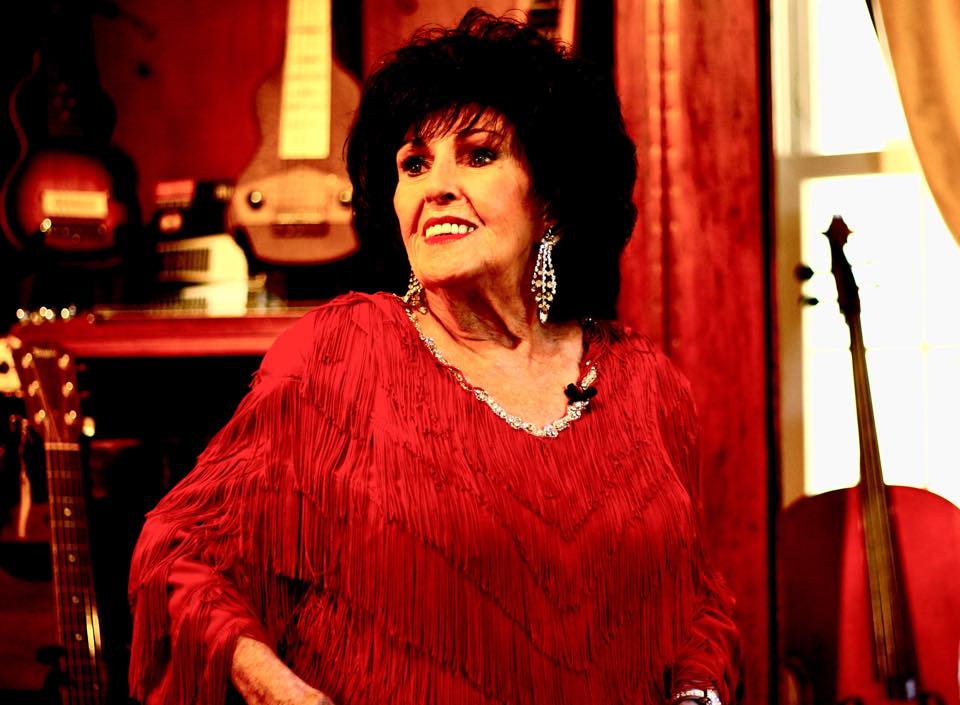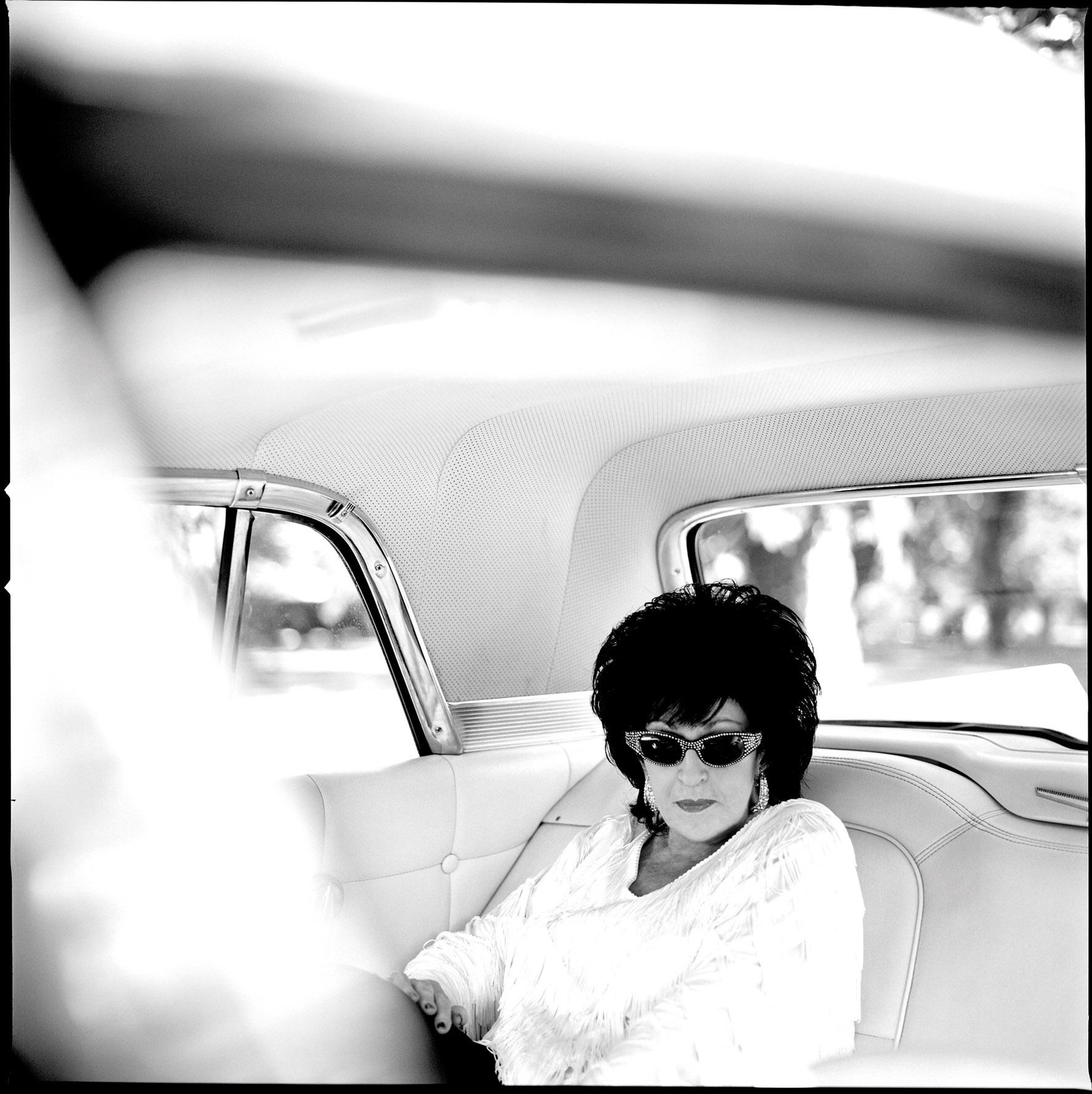“Queen of Rockabilly” Wanda Jackson talks to C&I about her upcoming autobiography, Every Night Is Saturday Night: A Country Girl’s Journey to the Rock & Roll Hall of Fame, out November 14.
One of the most influential women in rock ’n’ roll, Wanda Jackson has lived a life fit for storytelling. Luckily, fans won’t have to wait too long to hear those true tales. On November 14, the “Queen of Rockabilly” is releasing her autobiography, Every Night Is Saturday Night: A Country Girl’s Journey to the Rock & Roll Hall of Fame. In it, the country-turned-rock-icon responsible for classic hits like “Let’s Have a Party” and “You Can’t Have My Love” gives fans an inside look into her life and influential music career.
The book spans the 79-year-old Jackson’s career, from her early fame at the age of 16 with her debut single, “You Can’t Have My Love,” to her time touring with Elvis Presley to her recent work with rock luminary Jack White and her continued touring and recording efforts.
Recently, the Oklahoma native talked with C&I about her upcoming autobiography, the barriers she’s broken, the hardships she’s faced, her time with Elvis, and pending plans to work with Joan Jett.
Cowboys & Indians: Why did you decide to release an autobiography now?
Wanda Jackson: I was always told by everybody, from fans to family members, to do one. But I always thought I didn’t have the type of lifestyle that most people want to read about. I was never on drugs or never in rehab or never been divorced, and so I thought I didn’t have the story. Scott Bomar helped me write the book. He said, “That is your story, that you made it through show business for 60-something years and didn’t get messed up with drugs or what have you.” So I said, “Well, OK. That makes sense. And maybe it’ll encourage others to do it the way you’re supposed to, take care of your family and try to make it all work.”

C&I: That’s amazing. What do you hope your fans will take from it?
Jackson: Well, I think maybe they should feel like they know me better, or me personally, about my mother and dad, and then about my family, my husband and two kids and four grandkids and one great-grandchild. I want them to feel like they know these people a lot better after they read the book. And I hope it will hold their interest. I think it will. I’ve got about 80 photos throughout the book, some in color and some are black and white. But, anyway, I hope they find it to be a good read, something they’ll enjoy.
C&I: I’m definitely excited about reading it. As the First Lady of Rockabilly, you no doubt had to overcome some hardship. What were those challenges like and what lessons from your experience would you share with aspiring female artists today?
Jackson: Well, all I know is I had a dream and I had a goal, things that I wanted to achieve, and I was fortunate — I realized that. I was surrounded, and still am, with good people who really cared about me. I’ve never had someone that wants to steal from me or use me in any way, so that made it easier for me. But I would just tell the women to keep that dream in front of you.
If you get sidetracked here and there, if you have to work at something else to keep body and soul together, well, that’s OK. But keep your dream and your goals in your eyesight and just don’t give up if you feel that’s what you want to do with your life and that’s what makes you happy. I think people should be happy about what they do. I feel very sorry for people that have to punch a time clock and work at a job that they don’t care anything about. It’s much easier and it’s hardly considered work when you get to do what you enjoy doing and you make a living at it. So it’s well worth hanging on to your dream.
C&I: That’s some great advice. Do you have a section of your upcoming autobiography you’re most proud of?
Jackson: Well, I don’t know. I’ve got about 80 of my personal photos in there and all I know is when I read someone’s biography, I love seeing the photos of the people that I’m reading about. With that in mind, I let them into my private photos and scrapbooks and things, and I hope that people will enjoy seeing the photos and reading about all these wonderful people that have been in my life.
C&I: Do you have a favorite photo that you’re sharing?
Jackson: I’ve got two or three photos of Elvis and I. And I have one with Hank Thompson and with Jack White and Johnny Cash and Jerry Lee Lewis — people like that. I’m proud to show off those photos.
C&I: When you first started out, you were singing with the all-male group the Brazos Valley Boys before going solo and opening for Elvis Presley. What was it like breaking out on your own in a mostly male-dominated business?
Jackson: Well, I wasn’t ever alone. My father acted as my manager and drove for me and took care of what business needed to be done, so I always had help.
C&I: So a solid foundation and family made a difference. Do you have any special memories from your time touring Elvis?
Jackson: Oh ... he was a big joker and he was a happy-go-lucky guy about 1955, when I began working with him. His career was exploding around him, so it was an exciting time for me to be on tour with him and to see this.
C&I: Any special memories from that time?
Jackson: We were working in Memphis and we got in town I guess the night before, so I had all day off and he came and picked me up at my hotel and took me out to his house to show me this new kind of music that he wanted me to start doing. He said, “I think you need to do this if you want sell a lot of records.” And so he took me there and he’d play a record and then pick up his guitar and say, “But if you do this to the song ... ” and just gave me an idea of rock ’n’ roll.
So I had a good teacher and he made me promise that I would try it, even though I wasn’t at all convinced that I could sing it, because I told him, “Well, I’m just a country singer and I’m a girl, so I can’t sing that music that did you do.” He said, “Yes, you can. I know you can. And if you want your records to sell, you need to record songs that the young people like. This is their kind of music and they’re the ones that buy the records now, not just adults anymore. They’re the ones that call radio stations and request your records to be played, so they’re very important to a career.”
After my dad and I thought about it and talked with him some more about it, I was convinced that I should at least try to sing this kind of music. So once I found a song and recorded it and sang it, I thought, My goodness, I found a home. I like this stuff. I love to sing it. And that’s when things began to change for me because I had two genres then, country music as well as rock ’n’ roll, and that’s the way it’s always been throughout my career.

C&I: Do you prefer one over the other?
Jackson: No, not necessarily. When I’m just singing here at home to keep my voice, you know, ready to go, I do country stuff mostly. But then I’ll throw in some rock stuff ... I’m not practicing necessarily. I’m singing songs that I don’t even do on my show. It’s just to keep my voice working good.
C&I: Over the years you’ve gotten to perform alongside and work with so many talented artists. You collaborated with Jack White on the album of covers he produced in 2011, The Party Ain’t Over, on which you sing everything from the Amy Winehouse hit “You Know I’m No Good” to Bob Dylan’s “Thunder on the Mountain.” And you’ve got something in the works with fellow female rocker Joan Jett. What were those experiences like, and can we expect any more team-ups in the future?
Jackson: Well, of course, for the future I really don’t know about that. But, first of all, Joan Jett, I haven’t really worked with her yet. I’ve been at her shows a lot and we’ve talked and we’re friends, but as far as working on the bill with her, I haven’t. But she wanted to do an album and let her produce it on her record label, Blackheart, so I made several trips to Nashville to write songs for this album.
Since the one with Jack was all cover songs, I thought I needed to do an album of original songs, so that’s why I was writing with the young people in Nashville, the great songwriters. We still don’t have our album recorded. We just cannot even get together. Every time we try, something happens. I was in the hospital a big part of a year and a half and I was wiped out from all that, so I had to get my strength built back up and things like that. I’m hoping that sometime before the year is over we can at least get started on this album.
Jack White — that was quite an experience and it was a wonderful experience for me. Seldom have I worked with a producer that knew exactly how he wanted me to sing a song, the way he could hear it in his head. So I strived real hard to do it, and he’s a real slave driver in that sense. But I would eventually get it. He’d say, “That’s a take. That’s what I’ve been looking for.” And he told me at the very beginning, “Wanda, I’ve been a fan of yours since I was in high school and I’m not out to change your style, by any means. I just want to give you some fresh songs to sing.” And so that’s what we did. They were all cover songs.
C&I: Well, it turned out really wonderful and I’m a big fan of it. What was it like reaching success at 16 when your hit “You Can’t Have My Love” reached the Top 10? How did it change your life?
Jackson: Oh, it didn’t change anything that I can recall. I was just a very happy kid. I was a junior in high school, so I was tied down. I couldn’t go on the road to actually make any money by having a hit song, but people here in Oklahoma City were quite proud of me, and I probably did more television and interviews and things like that. But as far as changing me, it didn’t.
C&I: Tell me about your partnership and working relationship with your guitarist, Roy Clark. How do you think his talents added to your music?
Jackson: Well, he’s a fantastic guitar player, and when I hired him to front my band, it was because I was working in Vegas and I got the opportunity to go to the Golden Nugget. So I had my band, but in Vegas you work 45-minute sets and you have 15 minutes off, and you do that through your whole shift. So that was about five 45-minute shows, and I needed some help with someone that could sing. And then the fact that he played such great guitar, that was a bonus. And he was also quite funny. So he made a very good frontman for me. And then I helped him. By him working with me, the people at Capitol Records came to our opening at the Nugget and they saw Roy Clark for the first time, and he wound up on Capitol Records. He’s had several hits and he did the TV show and all, and I was very proud that I was able to help someone that had real talent.
C&I: So in the 1960s you started to mostly perform country music. Did you start off in country music or in rock ’n’ roll?
Jackson: I started in country music.
C&I: And then went into the rock ’n’ roll and then back into country?
Jackson: Right. I couldn’t get airplay with my rock ’n’ roll things. America wasn’t accepting Elvis and Jerry Lee and those people, so they sure weren’t going to help a teenage girl singing this “evil” music — you know, that they called it. So in order to keep my contract and to keep selling records, I went back into country and I had three pretty good hits right in a row, so it proved to be a good move for me.
C&I: Yeah, “Whole Lotta Shakin’ Goin’ On” and “Honey Don’t” — those are some wonderful songs. I’m a big fan.
Jackson: I still do “Whole Lotta Shakin’” like an encore. People just love that song.
Preorder Every Night Is Saturday Night: A Country Girl’s Journey to the Rock & Roll Hall of Fame here.













